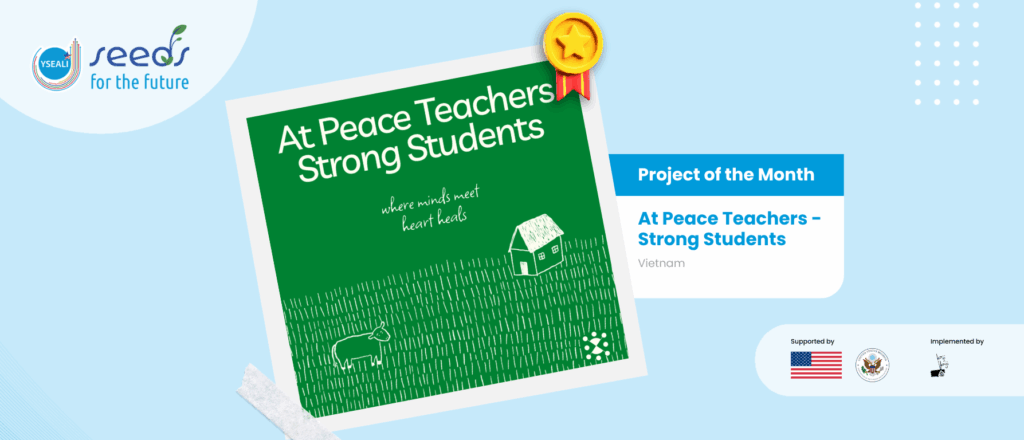About the Project
“At Peace Teachers – Strong Students” arose from a critical observation: teachers, particularly in post-disaster environments, were shouldering significant emotional support roles for students but lacked adequate mental health resources for themselves. This led to a noticeable increase in educator fatigue, with few avenues for processing or recovering from the emotional toll.
Insights from many mental health studies underscore how this unaddressed stress often subtly transfers from teachers to students. These insights became the bedrock of the project, directly challenging the assumption that teacher well-being is secondary. Our premise is simple and practical: when teachers are grounded, classrooms become stronger.
Why do you care about this specific topic/issue?
Rooted in educational and research backgrounds, our observations revealed that we seldom discuss occuring mental health concerns. What initially appeared to be isolated struggles eventually unveiled a larger pattern of neglect. This issue resonates deeply, mirroring a quiet crisis unfolding in classrooms everywhere. Inconsistent or invisible support for teachers, we recognize, not only impacts morale but also the entire learning process.
Why did you decide to start this project?
Identifying the stigma around mental health and the lack of resources for teachers, especially in post-disaster settings, motivated our team to act. We saw firsthand how teachers and students were not receiving the mental health support they needed. Conversations with mental health professionals and observations of growing fatigue among educators underscored the urgency of the situation, prompting us to develop a practical, targeted response.
What are your goals for this project?
Our project is dedicated to strengthening mental health support for teachers by making well-being a visible and practical priority within schools. At our core, we want to empower educators to recognize early signs of emotional strain, access reliable support tools, and foster a culture where we openly discuss and proactively address mental health.
To achieve this, we will deliver interactive workshops designed for direct engagement and practical skill-building. We’ll also distribute a tailored mental health handbook, putting accessible resources at their fingertips. To sustain awareness and engagement long-term, we’re launching a podcast series that will keep the conversation going and offer ongoing support.
How will YSEALI Seeds help you achieve your goals?
YSEALI Seeds has been instrumental in bringing this project to life, providing essential funding and connecting us with key stakeholders. Their support has enabled us to implement our activities effectively. The mentorship and guidance we’ve received have been invaluable, helping us refine our approach. Furthermore, the YSEALI Coordinator’s network will be crucial in linking us to additional resources and connections, which will be instrumental in advancing this initiative even further.
What have you accomplished and implemented so far?
Our project has successfully forged strong partnerships with local authorities, including the education department in Thai Nguyen. We’ve formalized these relationships with schools through memorandums of understanding, a crucial step in cementing our commitment.
We achieved significant milestones when all participating schools and partners officially signed these agreements, clearly demonstrating their dedication to the initiative. We’ve also brought on board a team of passionate volunteers and conducted our first training session, preparing them for the activities ahead. To keep our community informed and engaged, we launched the project’s Facebook and LinkedIn pages.
These collective efforts have laid a solid foundation for our upcoming workshops and other planned activities, truly positioning us to effectively support teachers and their communities.
What are the most significant lessons learned you’ve experienced so far?
Through our initial groundwork and engagement with stakeholders, we’ve gained crucial insights. We’ve learned the significant importance of culturally appropriate communication and the need for flexible planning to accommodate teachers’ busy schedules. Early feedback has also strongly emphasized the value of providing practical tools and offering ongoing support that extends beyond our workshops.
What are the success stories you can share with others?
Although our project is still in its early stages, we’ve received very positive initial feedback from partner schools and local authorities. Our collaborative approach has successfully built trust and enthusiasm among stakeholders, creating a strong foundation for the work ahead.
Looking forward, we plan to take a more thoughtful and targeted approach by conducting a direct needs assessment with teachers. This will help us identify their specific challenges and priorities, ensuring that our upcoming workshops and resources address the real issues educators face. By listening closely to those on the ground, we will deliver meaningful support that truly makes a difference in teachers’ well-being and classroom environments.
